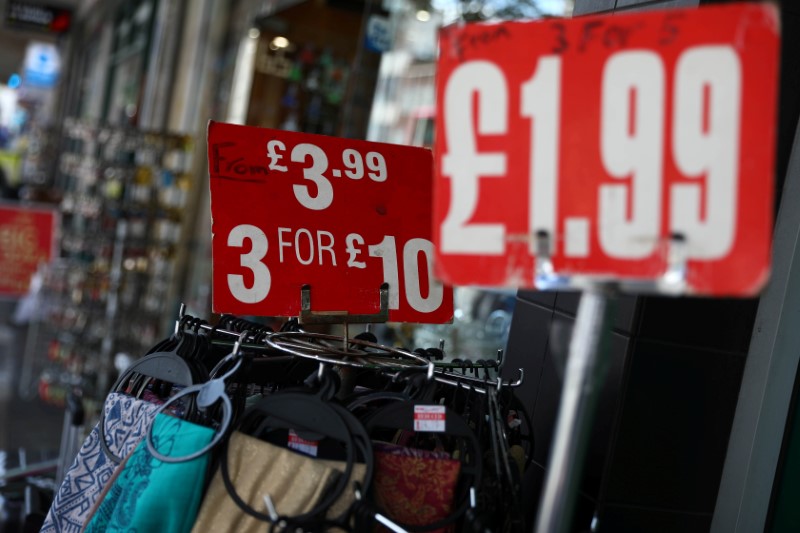 © Reuters. Prices are displayed on a store window in London
© Reuters. Prices are displayed on a store window in LondonBy Andy Bruce and William Schomberg
LONDON (Reuters) – British inflation jumped unexpectedly to a six-month high in August, pushed up by bigger-than-usual seasonal increases in sea and air fares and briefly sending sterling above $1.32 for the first time since July.
Consumer price inflation rose to an annual rate of 2.7 percent in August from 2.5 percent in July, the Office for National Statistics said – above all forecasts in a Reuters poll of economists that had pointed to a fall to 2.4 percent.
The ONS also said British house prices rose at the weakest annual rate in nearly five years, dragged down by the biggest drop in London house prices since 2009 – the latest sign of a slack housing market since the 2016 Brexit vote.
Wednesday’s data jolted investors. British government bond prices fell and sterling rose sharply, but it dropped later on a report Prime Minister Theresa May will reject a new European Union plan to solve the Irish border problem around Brexit.
The inflation figures are also likely to surprise Bank of England officials who had expected inflation to cool to 2.4 percent in August.
The BoE last month raised interest rates for the second time since the financial crisis but pointed to only gradual future increases as it expects inflation to drift down to near its 2 percent target in three years’ time.
Most analysts doubted the latest jump in inflation reflected a rise in underlying price pressures and was driven mostly by factors like theater ticket prices that were probably one-offs.
“Despite the overshoot, we are doubtful that we are likely to see any resulting shift in the mood music from those on the UK’s Monetary Policy Committee,” Investec economist Victoria Clarke said.
Still, the rise in inflation in August represents a setback to the modest recovery in real-terms wage growth that has helped to support economic growth this year.
The fall in the value of the pound in August on renewed concerns about Brexit deprived consumers of the benefit of a fall in oil prices in annual terms, the ONS figures showed.
Consumer price inflation hit a five-year high of 3.1 percent last November, when the inflationary effect of the pound’s tumble after Britain’s June 2016 referendum vote to exit the EU reached its peak.
GRAPHIC – UK economy interactive: http://tmsnrt.rs/2byBv8u
LONDON FALLING
The ONS said house prices in July rose by an annual 3.1 percent across the United Kingdom as a whole compared with 3.2 percent in June – the smallest increase since August 2013.
House prices in London alone fell 0.7 percent year-on-year in July, the biggest drop since September 2009.
“Slowing growth in house prices will encourage households to save a larger share of their incomes and will strengthen the case for the MPC to hold back from raising Bank Rate again within the next six months,” economist Samuel Tombs from Pantehon Macroeconomics said.
Despite August’s rise in the headline rate of inflation, the ONS data suggested there could be some relief for consumers in the months ahead.
Prices at British factory gates rose 2.9 percent year-on-year in August, the weakest increase in four months. Manufacturers’ costs for materials and energy also rose at the slowest pace in four months.
Fusion Media or anyone involved with Fusion Media will not accept any liability for loss or damage as a result of reliance on the information including data, quotes, charts and buy/sell signals contained within this website. Please be fully informed regarding the risks and costs associated with trading the financial markets, it is one of the riskiest investment forms possible.
Source: Investing.com





























